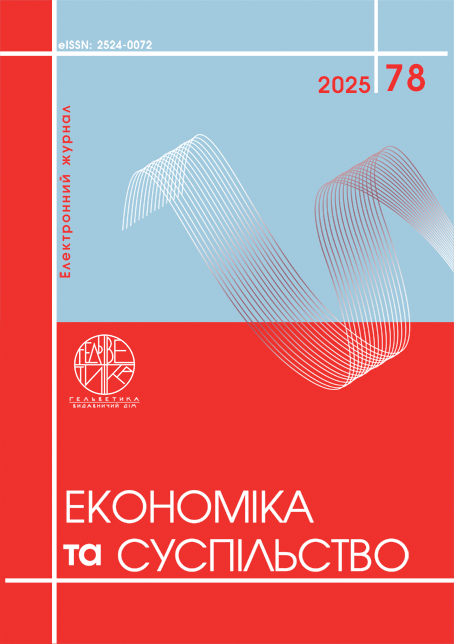FACTORS OF REGIONAL TOURISM DEVELOPMENT: ECONOMIC, SOCIO-CULTURAL AND INNOVATIVE DETERMINANTS
Abstract
The study refines the essence of the economic factors of regional tourism development, in particular the role of investments, infrastructure provision, and the impact of the tourism sector on employment and regional GDP. Socio-cultural determinants that shape the tourist attractiveness of territories are systematized, including cultural heritage, ethnic identity, traditions, and the development of creative industries. The approach to the consideration of innovative factors in tourism is clarified, in particular the digitalization of tourist services, the introduction of smart solutions, and new business models that ensure improved management efficiency and service quality. The importance of interaction between local communities and the tourism business is revealed as a condition for sustainable regional tourism development, which contributes to trust, the formation of a positive image, and the increase of territorial competitiveness. Strategic directions of development are outlined, with special attention paid to sustainable tourism, public-private partnership, and the integration of regional tourism products into global markets. The role of environmental factors such as the preservation of natural resources and the implementation of eco-technologies, which are becoming an important component of modern tourism policy, is emphasized. Prospects for the development of tourist destinations in the context of globalization challenges, digital transformation, and the growing role of innovative technologies are also outlined. The results of the study make it possible to formulate scientifically based recommendations for authorities, businesses, and local communities in order to increase the competitiveness of regions and ensure sustainable tourism development. The practical significance lies in the possibility of using the findings to improve strategic development programs, increase investment attractiveness, stimulate international cooperation, and expand Ukraine’s participation in the European tourism space. Additional emphasis is placed on the importance of developing human capital in tourism, training specialists with modern competencies, and integrating educational programs into the regional development system. The scientific novelty of the obtained results lies in the integration of economic, socio-cultural, and innovative determinants, which allows for a comprehensive assessment of the prospects for regional tourism development.
References
Бєлявцев М. Розвиток туристичної інфраструктури регіонів України: проблеми та перспективи. Київ : Наукова думка, 2020.
Deloitte. Global Travel and Tourism Outlook 2024. London: Deloitte Insights, 2024.
UNWTO. World Tourism Barometer 2023. Madrid: United Nations World Tourism Organization, 2023.
McKinsey & Company. Travel and tourism: Shaping the post-pandemic recovery. McKinsey Global Institute, 2023.
Pine B. J., Gilmore J. H. The Experience Economy. Harvard Business Review Press, 2019.
Гук Л. Культурна спадщина та туризм: регіональний вимір. Львів : ЛНУ імені Івана Франка, 2021.
Кудла Н. Соціально-економічні аспекти розвитку туризму в Україні. Харків : ХНЕУ ім. С. Кузнеця, 2019.
Ivanov S., Webster C. Tourism and the Impact of Technology. Springer Nature, 2021.
PwC. Hospitality Directions: Global tourism trends 2023. PricewaterhouseCoopers International, 2023.
Buhalis D., Amaranggana A. Smart Tourism Destinations. In: Xiang Z., Tussyadiah I. (eds.) Information and Communication Technologies in Tourism 2015. Springer, 2015.
Bieliavtsev, M. (2020). Rozvytok turystychnoi infrastruktury rehioniv Ukrainy: problemy ta perspektyvy [Development of tourism infrastructure of the regions of Ukraine: Problems and prospects]. Kyiv: Naukova dumka.
Deloitte. (2024). Global Travel and Tourism Outlook 2024. London: Deloitte Insights.
UNWTO. (2023). World Tourism Barometer 2023. Madrid: United Nations World Tourism Organization.
McKinsey & Company. (2023). Travel and tourism: Shaping the post-pandemic recovery. McKinsey Global Institute.
Pine, B. J., & Gilmore, J. H. (2019). The experience economy. Harvard Business Review Press.
Huk, L. (2021). Kulturna spadshchyna ta turyzm: rehionalnyi vymir [Cultural heritage and tourism: Regional dimension]. Lviv: Ivan Franko National University of Lviv.
Kudla, N. (2019). Sotsialno-ekonomichni aspekty rozvytku turyzmu v Ukraini [Socio-economic aspects of tourism development in Ukraine]. Kharkiv: Simon Kuznets Kharkiv National University of Economics.
Ivanov, S., & Webster, C. (2021). Tourism and the impact of technology. Springer Nature.
PwC. (2023). Hospitality directions: Global tourism trends 2023. PricewaterhouseCoopers International.
Buhalis, D., & Amaranggana, A. (2015). Smart tourism destinations. In Z. Xiang & I. Tussyadiah (Eds.), Information and communication technologies in tourism 2015 (pp. 553–564). Springer.

This work is licensed under a Creative Commons Attribution 4.0 International License.


